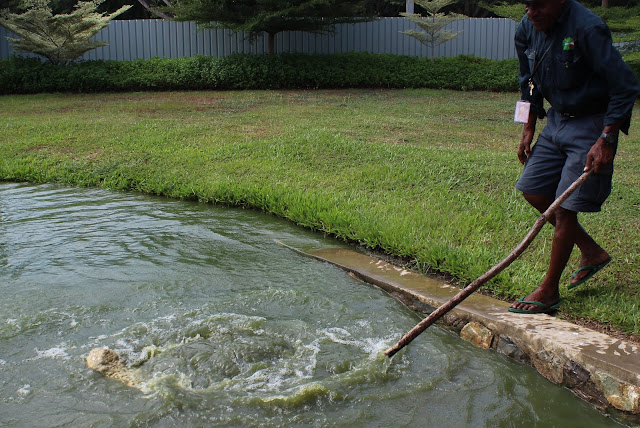According to the Papua New Guinea Education Secretary, 21430 Grade 12 students have sat the national examinations this year. Dr Tapo also revealed that only 4500 spaces are available for the academic year 2015 at all higher learning institutions. That means that 20% of students in Grade 12 will be considered for universities and colleges throughout the country.
The drop-out figure could be more than 80% (16730). Take a look at the data and facts presented. The irregularities are pretty shocking!
English and Literature (E&L) exam are compulsory/mandatory for all students. That means that if 21430 students have sat for the examinations, the same number should ALSO do the E&L exam. Unfortunately, the real number that sat the exam was put down to only 17236. So, who are those 4194 (i.e. 21430 - 17236) students?
In fact, the same number (21430) should also have sat for Mathematics examinations. The department statistics showed that 7091 students sat for Maths A and 13191 Maths B. That gives a total of 20282. Who are 1148 (21430 - 20282) students, where is their place in the total given by Dr Tapo?
Numbers presented by the secretary do not actually add up when we are talking about only 4500 spaces.
Take, for instance, the difference between the total of grade 12 students given by the secretary (21430) and those sitting E&L (17236) is about the same as the number of spaces available from tertiary institutions, i.e. 4500 available spaces vs 4194 unaccounted students sitting the exams.
Take, for instance, the difference between the total of grade 12 students given by the secretary (21430) and those sitting E&L (17236) is about the same as the number of spaces available from tertiary institutions, i.e. 4500 available spaces vs 4194 unaccounted students sitting the exams.
In the Maths exams, there are 1148 students who are suspiciously unaccounted for. We are talking about numbers in the thousands when there are only 4500 places. The odds indicated that dropout figures for this year could be more than what initially thought.
As a matter of clarification, students doing code, distance study or resitting exams could have been included.
But, even if they are included the irregularity is in the thousand and so there is a stiff competition between the 'known' and 'unknown' students, the accounted and the unaccounted. That means that more than 4000 students who are not attending a formal secondary school are also vying for one of the 4500 spaces.
But, even if they are included the irregularity is in the thousand and so there is a stiff competition between the 'known' and 'unknown' students, the accounted and the unaccounted. That means that more than 4000 students who are not attending a formal secondary school are also vying for one of the 4500 spaces.
Fair enough. But, the secretary for education should make this clear in his reporting. He is presenting figures that do not reflect the actual situation. How many students are not from the mainstream education system? At least put some meaning into the numbers.
The irregularities in numbers do indicate extra students are included in the total competing for the limited spaces. So who are they? We don't know. The point is: if 4000 students from the mainstream secondary school are competing for the 4000 spaces with another 4000 'ghost' students, the NET competition is zero.
In reality, those 4500 spaces are susceptible to bribery, manipulation and foul-play of all sorts. So, who suffers here? Those poor students who have spent the best part of their 12 years in the formal education stood little or no chance against a manipulative (unaccounted) lot.
The irregularities in numbers do indicate extra students are included in the total competing for the limited spaces. So who are they? We don't know. The point is: if 4000 students from the mainstream secondary school are competing for the 4000 spaces with another 4000 'ghost' students, the NET competition is zero.
In reality, those 4500 spaces are susceptible to bribery, manipulation and foul-play of all sorts. So, who suffers here? Those poor students who have spent the best part of their 12 years in the formal education stood little or no chance against a manipulative (unaccounted) lot.
The Papua New Guinea Department of Education needs to collect relevant and accurate data from schools around the country. The secretary analysis must base on factual data. He must not spit out data to the media when the numbers are flawed.
Make no mistake. The unambiguous numbers can have a dramatic effect on mainstream students - those young 18 and 19 years old. It is unfair to mistreat one student in the selection process, let alone thousands of them.
Make no mistake. The unambiguous numbers can have a dramatic effect on mainstream students - those young 18 and 19 years old. It is unfair to mistreat one student in the selection process, let alone thousands of them.
END: PNG education system is producing 80 - 90% dropouts at Grade 12 every year. Yet, the government does not have accurate data to help sort out this problem.
~~~~~~~~~~~~~~~~~~~~~~~~~~~~~~~~~~~~~~~~~
With only 1 in 5 PNG students able to get into tertiary education, there is fear that this will induce corruption http://t.co/jmCIy9j35g
— Keith Jackson (@PNGAttitude) October 26, 2014






